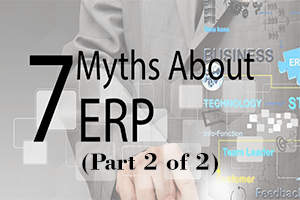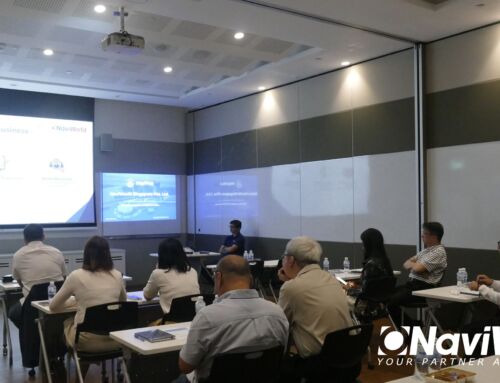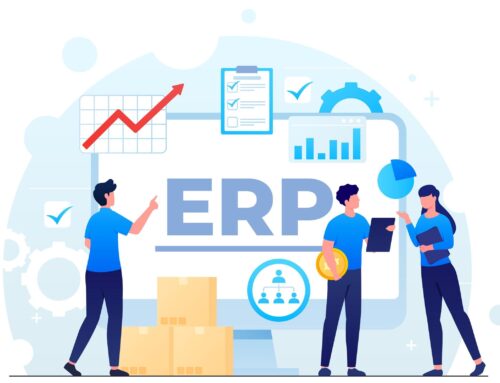
Seven Myths About ERP
(Part 2 of 2)
Introduction
In my previous articles on “Seven Myths About ERP (Part 1 of 2),” I mentioned at least seven ERP myths.
- ERP Project is IT Project
- Project Management is Not Important
- ERP can Solve the Human Problem
- We Can Customize to What you Want
- Good ERP Vendors have Awards
- There is the Best ERP for me
- Bigger Support Team is Better
I had previously covered two cases of project failure and the first three of the myths about ERP. In this article, I will go through the remaining myths and follow my recommendations to companies looking for ERP solutions.
The Remaining Myths About ERP
We Can Customize to What you Want
The Myth
Some ERP users expect the ERP to perform precisely the way that they want. And some ERP consultants are happy and proud to customize base on their customers’ wishes.
Users believe that these customizations will make their work easier.
Some ERP vendors even promised unlimited customization at a fixed cost.
This myth is probably the most common of the seven myths about ERP nowadays.
The Truth
The truth is: No ERP is perfect when the project went live.
If the ERP can be perfect, the ERP vendor will not create new versions and enhancements periodically.
Customization is how some ERP implementation partners make their money and tie down their customers. You can read my article on “Why You Should Minimize Customization in ERP Projects” and “Why You Should Avoid Customized Software” to understand the impact of customization. In short, customizing ERP is very expensive in the long run.
Often, the consultants can avoid or minimize customizations if they know the standard ERP and business processes well.
The truth is: Good ERP consultants minimize customizations.
Good ERP Vendors have Awards
The Myth

It seems logical that ERP vendors who won awards should be better ERP vendors.
It is also logical that vendors with many years of operations are better in implementation.
And, vendors with a larger pool of consultants should be better.
These are perhaps the oldest of the seven myths about ERP.
The Truth
The Awards
If you refer to the two failed projects that I wrote at the beginning of my previous article, you will notice that both projects were initially implemented by awards winning and established implementation partners.
In reality, we have to understand the nature of those awards and the organizations who gave away those awards.
No awards that I know of is directly related to implementation capability.
The software principals will not want to be legally liable for the project implementation of their resellers. Because of this implication of liability, software principals have little idea of their resellers’ project implementation. And even if they know, they will avoid getting implicated.
The Certifications
So, how do the software principals judge the capability of their resellers? And they need to be cautious not to get implicated by poor project implementation.
To work around this liability concern, software principals will include the certification requirement as criteria of their awards. They will award their resellers with Gold, Silver, Bronze awards according to the judging criteria.
However, the ability to pass certification may not necessarily indicate the consultants’ actual skill in project implementation.
Many years ago, I terminated a team leader who was a certified trainer of the ERP. His performance, product knowledge, and implementation management were so bad that I had to terminate him. And many of the good ERP consultants that I worked with did not necessarily have the latest certification.
Awards given by the ERP principal, such as the partner of the year award, mainly measure their resellers’ ability to sell the products. Often, good selling skill is not necessarily related to good implementation ability. But such awards help the reseller in selling. And these awards often pressure the reseller to maintain their selling effort. So, it is part of the channel management strategy adopts by the software principals.
Challenges in Acquiring ERP Skill
ERP implementation is a very specialized skill. It takes years to train a good consultant. If the vendor had some well-implemented project years ago, it does not necessarily mean that they will have the same quality now. Good consultants that they had previously may had left the company, or they may not assign good consultants for your project.
And I do not believe that there can be a mass market for high-quality ERP implementation. It is challenging to recruit, groom, and retain good ERP consultants. If the team grows too big and too fast, it will be challenging to achieve consistent high quality of implementation. Good ERP consultants are limited in their quantity.
So, the truth is: Awards has NOTHING to do with good implementation.
There is the Best ERP for me
The Myth
People think that there is the best ERP for their company. And some ERP vendors created market hype that they are the best ERP for specific industries or size of organizations. They often support their claim with customer references.
Some people will recommend the “Best ERP’ to their organization to not risk their careers by selecting other ERPs.
The Truth
In my more than 20 years of ERP career, I had come across companies who implemented the “Best ERP” and went bankrupt. I had also seen many poorly executed projects from these “Best ERPs.” Read my article on “How Do Changes in the ERP Market Affect Companies in Singapore” to understand why it is risky to implement bigger ERPs.
If there are best ERP for each industry or organization size, then there will only be very few ERP solutions remaining in the market now. But there are many choices of ERP solutions in Singapore now.
The truth is that companies need to also evaluate the implementation quality of the implementation partner together with the ERP functionalities. There is no best ERP. But you can select from many better ERPs.
Bigger Support Team is Better
The Myth
Many companies experienced poor support from their IT vendors. And they believe that the poor support service was due to insufficient support personnel. The lack of support personnel led to slow response and issue resolution.
So, I often received a question asking me how big our support team is.
The Truth
The truth is, most vendors do not emphasize the quality of their support as it is often not the most exciting task.
Vendors often filled their support team with new or inexperienced consultants. Commonly, vendors use support tasks as training for their new consultants. Management seldom tracks the performance of the support team until they receive complaints. Some vendors use the support as the opportunity to create more chargeable services.
About ten years ago, I took over a support team that consists of one support manager and two support consultants. Initially, there were more than 120 support cases in the backlog. The support manager often complained that he was understaffed.
I terminated the three-person team and recruited just one junior consultant to replace them. With a less experienced support consultant but with better management, we managed to reduce the support backlog to only slightly more than 20 backlogs at any one time in less than six weeks.
Lessons Learned
- A bigger support team is not necessarily better. Support consultants may create work to justify their job that may not translate to better customer services.
- Proper management of support is more important than the number of consultants.
- It is essential to set the correct KPIs for the support team to reflect the customer service level directly.
Why Big Support Team
Keeping a big support team is very costly. So, why do some vendors maintain a big support team? The probable reasons could be:
- Their projects are heavily customized. Customizations tend to result in more bugs. It is also time-consuming to diagnose a customization bug than a standard software issue. Hence more support consultants will be needed.
- The vendors were unable to stabilize their project quickly when the projects went live. So, the vendors use a support team to handle project problems after projects went live.
- Consultants were not able to solve the root cause of the support issues. I had come across cases when the support consultants patched the numbers directly into the database every month. When the support consultant could not identify the root cause of the issue, they had to resort to primitive data patching periodically.
What do you Really Want?
So, answer this question: Are you paying for more support consultants, or are you paying for better support services?
Who Need More Support Consultant? It is the vendors who have more support issues to handle and could not resolve them efficiently who need more support consultants.
Find out how your implementation partner manages its support and how it measures its support team’s performance. Not how many support consultants that it has.
Overcoming the 7 Myths about ERP
There are a few ways to overcome these myths.
- Do your research and understand the awards
- Create Demo Flow for Evaluation
- Conduct detail understanding of the customer references of your shortlisted implementation partner
- Minimize Customization
- Manage the user expectation, go live as soon as possible
- Focus on your objectives rather than the look of the software
Read my article on “How to Select ERP for SME” to learn more.
Remember, knowledgeable customers select knowledgeable ERP vendors. If you would like to discuss more, please do not hesitate to contact us.





